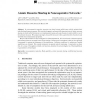Free Online Productivity Tools
i2Speak
i2Symbol
i2OCR
iTex2Img
iWeb2Print
iWeb2Shot
i2Type
iPdf2Split
iPdf2Merge
i2Bopomofo
i2Arabic
i2Style
i2Image
i2PDF
iLatex2Rtf
Sci2ools
INFOCOM
1997
IEEE
1997
IEEE
Atomic Resource Sharing in Noncooperative Networks
In noncooperative networks, resources are shared among selfish users, which optimize their individual performance measure. We consider the generic and practically important case of atomic resource sharing, in which traffic bifurcation is not implemented, hence each user allocates its whole traffic to one of the network resources. We analyze topologies of parallel resources within a game-theoretic framework and establish several fundamental properties. We prove the existence of and convergence to a Nash equilibrium. For a broad class of residual capacity performance functions, an upper bound on the number of iterations till convergence is derived. An algorithm is presented for testing the uniqueness of the equilibrium. Sufficient conditions for achieving a feasible equilibrium are obtained. We consider extensions to general network topologies. In particular, we show that, for a class of throughput-oriented cost functions, existence of and convergence to a Nash equilibrium is guarant...
Related Content
| Added | 06 Aug 2010 |
| Updated | 06 Aug 2010 |
| Type | Conference |
| Year | 1997 |
| Where | INFOCOM |
| Authors | Lavy Libman, Ariel Orda |
Comments (0)

